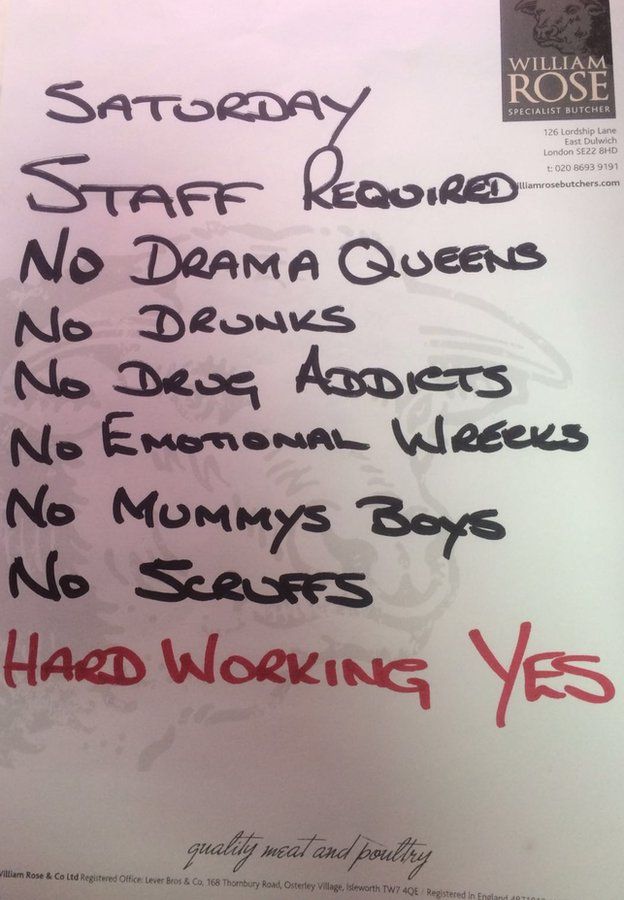The insurance group say that these words would potentially discourage the over-50s from applying to their jobs, that they are “younger-age stereotypical words” – associated with younger applicants, or criteria that young applicants may feel more able to demonstrate that they fulfil. Whilst there may be a business reason why the Phoenix Group are doing this (there are reportedly 800,000 people between 50 and 64 that are either actively seeking work or would like to work), there are also legal implications of using the wrong words in your job adverts.
Some of you may remember a few years ago when a London butcher put an advert in their shop window for a Saturday job:

There are a plethora of reasons why this advert is inappropriate from a legal perspective, but most importantly each of the criteria above could, arguably, be held to be indirectly or indeed directly discriminatory. Job adverts are notoriously a place where employers will fall down when it comes to discrimination. For example, stating that you don’t want “emotional wrecks” could be seen by applicants with mental health issues, who may have the protected characteristic of disability, as a clear statement from the employer that applications from them will not be considered. Using the Phoenix Group example of using “enthusiastic” and “energetic” – someone who is older may feel that they are less able to fulfil that criteria than a younger applicant, and therefore may feel they are at a disadvantage before they have even applied.
It is possible to include genuine occupational requirements within a job advert. For example, if you are applying to the Fire Service, there will be a requirement for you to have certain level of fitness and ability if you are to undertake active duties. That is a genuine occupational requirement which is a proportionate means of achieving a legitimate aim – that aim being the ability to pull someone from a burning building. Obviously, if you were in a wheelchair, pulling someone from the top floor of a burning building is going to be a challenge and ultimately, may not be possible. Accordingly, it would be proportionate and legitimate for a job advert for the Fire Service to state that you have to be a certain level of ability and fitness.
In the case of the Phoenix Group, saying someone needs to be energetic and enthusiastic to work in an insurance firm is unlikely to be justified. Presumably an employee working for the Phoenix Group would be sat a desk for most of the day. Yes, the personal attributes of bringing energy to a team and being enthusiastic about your role would be desirable, but these are not genuine occupational requirements of the role and run the risk of being held to be discriminatory. Ultimately, the same effect can be achieved by using words that are not associated with a younger applicant. As above, there may be a business reason why Phoenix Group may have removed these requirements from their job adverts, but it’s also legally a sensible decision.
Many of our clients are struggling to recruit at the moment, because of Brexit or coronavirus related changes to the candidate pool, and so are trying to think of other ways to make their job adverts as eye-catching or enticing as possible. But a word of warning – be careful about using descriptors/requirements which on the face of it may seem innocent and targeted at your ideal candidate, as your choice of words may also discourage candidates from protected groups.
If you would like any help with your job adverts or recruitment strategy, we can help. To deepen your understanding of your obligations under the Equality Act 2010, you’re also welcome to join our free, online breakfast briefing on 15th February 2022.
We’ll use real-life examples to help you understand when and where issues can arise, so you can spot and tackle any underlying cultural issues in your workplaces in order to better promote an inclusive environment.




